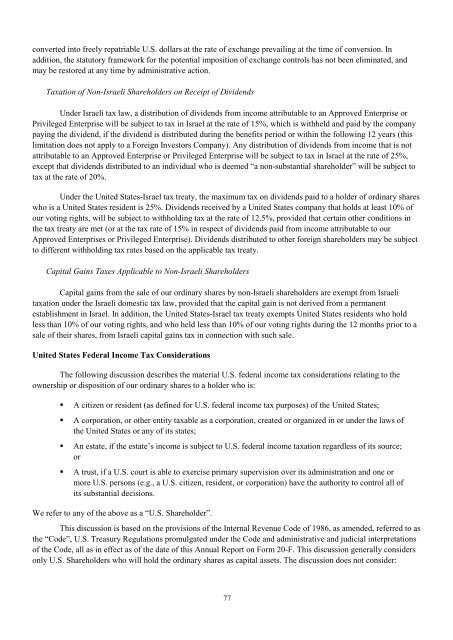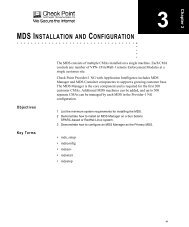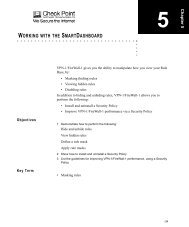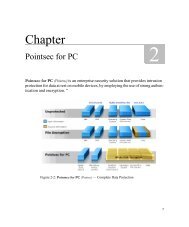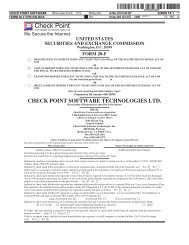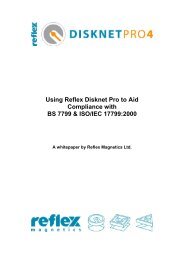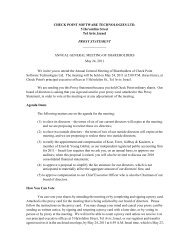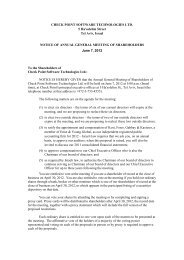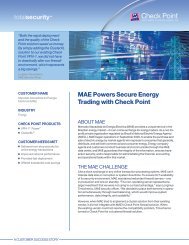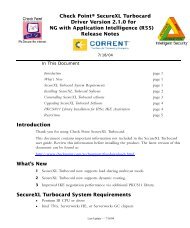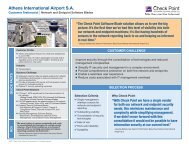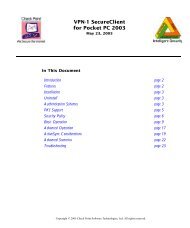FORM 20-F - Check Point
FORM 20-F - Check Point
FORM 20-F - Check Point
Create successful ePaper yourself
Turn your PDF publications into a flip-book with our unique Google optimized e-Paper software.
converted into freely repatriable U.S. dollars at the rate of exchange prevailing at the time of conversion. In<br />
addition, the statutory framework for the potential imposition of exchange controls has not been eliminated, and<br />
may be restored at any time by administrative action.<br />
Taxation of Non-Israeli Shareholders on Receipt of Dividends<br />
Under Israeli tax law, a distribution of dividends from income attributable to an Approved Enterprise or<br />
Privileged Enterprise will be subject to tax in Israel at the rate of 15%, which is withheld and paid by the company<br />
paying the dividend, if the dividend is distributed during the benefits period or within the following 12 years (this<br />
limitation does not apply to a Foreign Investors Company). Any distribution of dividends from income that is not<br />
attributable to an Approved Enterprise or Privileged Enterprise will be subject to tax in Israel at the rate of 25%,<br />
except that dividends distributed to an individual who is deemed “a non-substantial shareholder” will be subject to<br />
tax at the rate of <strong>20</strong>%.<br />
Under the United States-Israel tax treaty, the maximum tax on dividends paid to a holder of ordinary shares<br />
who is a United States resident is 25%. Dividends received by a United States company that holds at least 10% of<br />
our voting rights, will be subject to withholding tax at the rate of 12.5%, provided that certain other conditions in<br />
the tax treaty are met (or at the tax rate of 15% in respect of dividends paid from income attributable to our<br />
Approved Enterprises or Privileged Enterprise). Dividends distributed to other foreign shareholders may be subject<br />
to different withholding tax rates based on the applicable tax treaty.<br />
Capital Gains Taxes Applicable to Non-Israeli Shareholders<br />
Capital gains from the sale of our ordinary shares by non-Israeli shareholders are exempt from Israeli<br />
taxation under the Israeli domestic tax law, provided that the capital gain is not derived from a permanent<br />
establishment in Israel. In addition, the United States-Israel tax treaty exempts United States residents who hold<br />
less than 10% of our voting rights, and who held less than 10% of our voting rights during the 12 months prior to a<br />
sale of their shares, from Israeli capital gains tax in connection with such sale.<br />
United States Federal Income Tax Considerations<br />
The following discussion describes the material U.S. federal income tax considerations relating to the<br />
ownership or disposition of our ordinary shares to a holder who is:<br />
� A citizen or resident (as defined for U.S. federal income tax purposes) of the United States;<br />
� A corporation, or other entity taxable as a corporation, created or organized in or under the laws of<br />
the United States or any of its states;<br />
� An estate, if the estate’s income is subject to U.S. federal income taxation regardless of its source;<br />
or<br />
� A trust, if a U.S. court is able to exercise primary supervision over its administration and one or<br />
more U.S. persons (e.g., a U.S. citizen, resident, or corporation) have the authority to control all of<br />
its substantial decisions.<br />
We refer to any of the above as a “U.S. Shareholder”.<br />
This discussion is based on the provisions of the Internal Revenue Code of 1986, as amended, referred to as<br />
the “Code”, U.S. Treasury Regulations promulgated under the Code and administrative and judicial interpretations<br />
of the Code, all as in effect as of the date of this Annual Report on Form <strong>20</strong>-F. This discussion generally considers<br />
only U.S. Shareholders who will hold the ordinary shares as capital assets. The discussion does not consider:<br />
77


